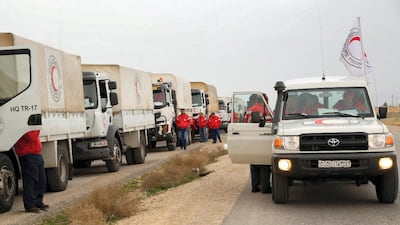The United Nations is urging the international community to find a feasible solution to the fate of thousands of civilians stuck inside a Syrian displacement camp.
Rukban camp, described by those living inside as a “hell on earth," last week received its biggest shipment of aid supplies by the UN and Syrian Arab Red Crescent.
“The challenge now is to work towards improving their situation and finding solutions to their plight. Rukban is not a place for people, mostly women and children, to live. We need support and commitment of all parties,” Sajjad Malik, the UN High Commissioner for Refugees representative in Syria, said.
The convoy of 133 trucks carrying aid including food and clothes for children reached the outskirts of the Rukban camp earlier this month. It included healthcare items and medical supplies to immunise women and children.
The camp, described by residents as a “prison," is home to an estimated 40,000 Syrians that are in dire need of regular aid from the UN and partners, especially as supply routes are often blocked.
Families lack firewood and “end up collecting garbage and plastic to make a fire to cook and keep warm,” the UN said in a statement.
Since December last year, at least eight children – most of them newborns – died in the camp due to freezing temperatures and lack of medical care.
"Everyone should bear in mind how sensitive our situation has become which can't be solved by only aid convoy, but needs a decisive decision to end our suffering," Abdul Fataah Ali, a 45-year-old teacher who currently resides inside the camp, told The National.
Conditions inside the camp have deteriorated, with many inside surviving on just one simple meal a day, often bread and olive oil or yoghurt, residents have said.
"I appreciate the relief and support that has arrived recently, most of us got food that will last for couples of days, but then what? We'll quickly run out and come back to where we started," Jomana Haj Omar, a 28 year-old mother told The National.
Ms Omar, who is currently pregnant, spoke about the dire conditions that her family is currently facing. “I wish I didn’t have children, under this condition you wish to not exist.”
“We are not allowed to leave this prison, why are we imprisoned? We are not ISIS, we are victim of their crimes and are being held here like hostages, why is that?” Ms Omar said.
Residents of the camp have been forced from their homes in Palymra and Homs by the war and many fled President Bashar Al Assad’s regime and ISIS.
Khaldoun Omyre, a 41-year-old resident of the camp with five of his family members, spoke about the shortages of food, medicine and electricity supplies that have caused dozens of deaths.
“They’ve not brought any fuel supply. Despite the horribly cold weather we have no way to heat our tents, we’re getting aches from the severe cold weather, but none care about this sadly, they only want to make sure we stay alive with this relief and don’t die,” Mr Omyre said.
Because of the miserable conditions, residents are hoping to escape to northern Syrian areas outside of the regime's control.
